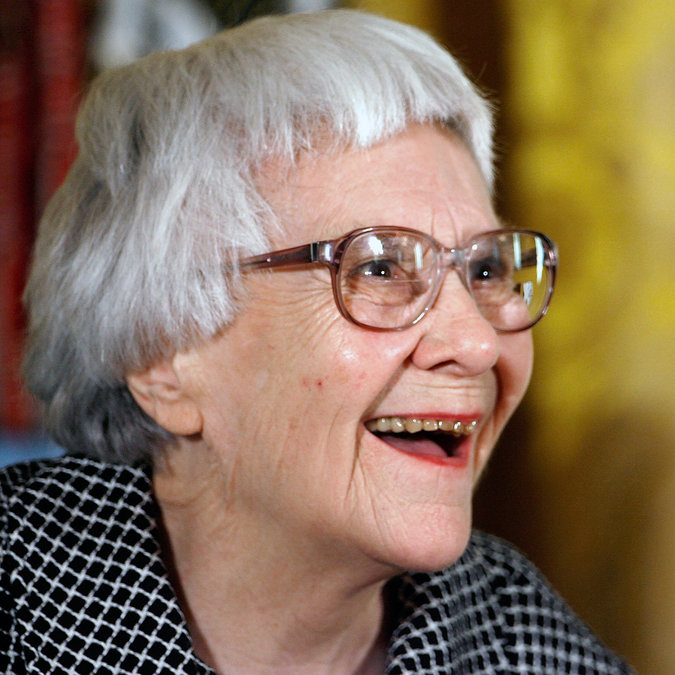1.
“Harper Lee, Author of ‘To Kill a Mockingbird,’ Dies at 89“: William Grimes pens an obit for the literary icon at The New York Times.
“The instant success of ‘To Kill a Mockingbird,’ which was published in 1960 and won the Pulitzer Prize for fiction the next year, turned Ms. Lee into a literary celebrity, a role she found oppressive and never learned to accept. The enormous success of the film version of the novel, released in 1962 with Gregory Peck in the starring role of Atticus Finch, a small-town Southern lawyer who defends a black man falsely accused of raping a white woman, only added to Ms. Lee’s fame and fanned expectations for her next novel. For more than half a century, it failed to appear. Then, in 2015, long after the reading public had given up on seeing anything more from Ms. Lee, a sequel appeared under mysterious circumstances. ‘I never expected any sort of success with ‘Mockingbird,’’ Ms. Lee told a radio interviewer in 1964. ‘I was hoping for a quick and merciful death at the hands of the reviewers, but, at the same time I sort of hoped someone would like it well enough to give me encouragement.’ Instead, she said, ‘I got rather a whole lot, and in some ways this was just about as frightening as the quick, merciful death I’d expected.’ Ms. Lee gained a reputation as a literary Garbo, a recluse whose public appearances to accept an award or an honorary degree counted as important news simply because of their rarity. On such occasions she did not speak, other than to say a brief thank you. In February 2015, her publisher, Harper, an imprint of HarperCollins, dropped a bombshell. It announced plans to publish a manuscript, long thought to be lost, that Ms. Lee submitted to her editors in 1957 under the title ‘Go Set a Watchman.’”
2.

“Hell in Oz“: Inspired musings about “The Wizard of Oz” from Richard Hell at Oscilloscope Labs.
“And the movie does have a lesson, a moral. At first, after reading the book, when I re-watched the movie, that annoyed me, that the movie had a moral, because the book does not have a moral, it’s just an adventure, more or less. It’s about a little girl who gets swept away from Kansas by a cyclone, to be deposited in a completely unfamiliar and strange other world, and then simply wants to find her way back home again, a pretty natural impulse. There are scary parts but she gets through with the help of some new friends and it’s all interesting and comforting. I remembered the movie as being magically perfect—an example, like say ‘Casablanca,’ of everything falling into place to make for perfection in the collaborative studio system. But when I re-watched the film after reading the book, I was kind of disappointed to see how the film, which is largely faithful to the book, departed from it in two important, kind of cop-out, cliché, Hollywood ways: first they turned the whole Oz sequence into a dream, the ultimate narrative cop-out, though of course that’s only revealed at the end, and, second, they gave the story an explicit, seemingly corny moral, recited by Dorothy just before she gets returned to Kansas. She says she’s learned that, ‘If I ever go looking for my heart’s desire again, I won’t look any further than my own back yard, because if it isn’t there, I never really lost it to begin with.’ Which, to the extent that it makes any sense at all, at first sounds really conservative and reactionary, namely that you shouldn’t ever go searching for something exciting or better, but just stay at home where it’s safe. The pretext for that moral, the running-away-in-search-of-something plot point, does not exist in the book. But in the movie Dorothy decides to run away from home to escape Miss Gulch’s witchy Toto-oppression, and Aunt Em’s and Uncle Henry’s acquiescence in it, and to see the wide world. Indirectly, this is what results in her being carried off by the cyclone (because it makes her late getting back to the storm cellar). In the book, there is no Miss Gulch (and no poignant farm hands or mysterious Professor Marvel or anyone else except Aunt Em and Uncle Henry), and no running away: you just get the setup of the poor three-person small farm in grey Kansas, the dog which Dorothy dotes on, and then the crazy cyclone carrying the girl and the dog to Oz. Oz is real, it’s not a dream, and Dorothy was not unhappy and had no intention of running away from home.”
3.

“‘The Witch’ Reawakens Childhood Nightmares“: My take on the spectacularly scary new film from Sundance prize-winning director Robert Eggers at Indie Outlook.
“This may be, in fact, the first film to reawaken in me the terror I felt as a kid when I stumbled upon Len Talan’s 1987 production of ‘Hansel and Gretel’ on the Disney Channel. It’s a low-budget charmer chockfull of cheesy dialogue and performances (and, alas, songs), but there are some indelibly eerie sequences that spooked me throughout my childhood. Cloris Leachman’s portrayal of the witch is a stroke of genius in how funny it is, at least initially, luring the characters (and kiddies in the audience) into embracing her as a doddering old granny. When she suddenly turns evil, it’s all the more terrifying. I was reminded of this film during the scene in ‘The Witch’ where young Caleb (Harvey Scrimshaw) comes upon a house located deep in the forest. There’s no question that the boy is frightened, but he also feels drawn to it, moving toward his potential doom like a moth to a flame. Though this may seem like a direct quote from ‘Hansel and Gretel,’ that fable’s moral can essentially be boiled down to, ‘don’t take candy from strangers.’ There’s something more unsettling going on in ‘The Witch,’ as evidenced by the big-chested woman who slinks out of the house before walking seductively towards Caleb (while Korven’s score pays blatant homage to Györgi Ligeti’s ‘Requiem for Soprano, Mezzo Soprano, Two Mixed Choirs and Orchestra’). She’s taking advantage of the sexual curiosity the boy displayed when he glanced down the shirt of his older sister, Thomasin (Anya Taylor-Joy, an astonishing discovery), before averting his gaze with guilt-ridden angst.”
4.

“Can She Pull It Off? (Or, How to Hire Women Directors)“: A great piece from Katy Chevigny at Filmmaker Magazine.
“Okay, back to the puzzle of: why so few women still? Let’s first dispense with some of the reasons that have been put forth over the years. One explanation for the persistent lack of women directors is that Hollywood is still an old-boy network. Granted. But weren’t law firms an old-boy network? Women have made serious inroads in lots of old-boy networks, so there must be something else going on here as well. Another common reply is: There aren’t enough women directors to fill the jobs. This has been disproved a number of times, and most recently with The Director List, a social media-driven movement that has succeeded in compiling a list of over 1,000 women directors in order to prove the opposite. Some have casually dismissed the Director List, arguing that it’s padded with amateurs with little experience – but for the record, I know several talented female directors who aren’t even on this list, so our bench goes much deeper. A third common answer: The kinds of films being made by the studios are male-centric and women directors aren’t the right fit. Isn’t this related to Problem Number One, the old-boy network? It’s a big assumption that women can’t direct films about male protagonists (Hello, ‘Hurt Locker’) and it makes little sense that so few films with women protagonists are greenlit, when in fact many of them are hits (2015 gave us ‘Spy’ and ‘Pitch Perfect II,’ among others.) So really, we need to ask why this male-dominated mode of filmmaking is so slow to change when compared to what we’re seeing in other fields.”
5.

“How the $100 Million ‘NYPD Blue’ Creator Gambled Away His Fortune“: A profile of David Milch from Stephen Galloway and Scott Johnson at The Hollywood Reporter.
“The industry’s passion for gambling has taken many forms, from blackjack to poker to sports to roulette to the horses. During the 1970s and ’80s, A-listers from Walter Matthau to Johnny Carson to David Begelman met regularly to play poker, and those games helped oil the wheels of Hollywood’s business machine, not least for Begelman, an agent turned executive whose money problems were at the heart of one of Hollywood’s biggest scandals. After Begelman was found to have embezzled money from Columbia Pictures, essentially forging checks and cashing them himself, it was widely believed this was at least in part to cover his losses from cards. One man whose name he had used on a forged check told this reporter he forgave the executive, because ‘he always paid his gambling debts.’ Begelman committed suicide in 1995. There is, of course, a huge difference between occasional gamblers and addicts. Marc Potenza, a Yale professor of psychiatry and an expert on addiction, notes that some 70 percent or more of Americans gamble at least once a year, but ‘only 1 to 2 percent have a gambling disorder.’ In Hollywood, a place where every movie or TV show is a high-stakes bet, gambling often seems a natural complement to work. If cards have taken over from horse racing as the industry’s hobby of choice, both remain popular at the top echelons of the business.”
Image of the Day

No Film School‘s Andrew Lapin interviews Ross Adam and Ron Cannan about their documentary, “The Lovers and the Despot,” which recounts “the bizarre story of when dictator Kim Jong-il kidnapped a director and his wife.”
Video of the Day
Lola Kirke takes viewers inside the mind of an epileptic in Zia Anger’s five-part short film, “I Remember Nothing,” posted at Indiewire by Jonathan Kieran, courtesy of NoBudge.












